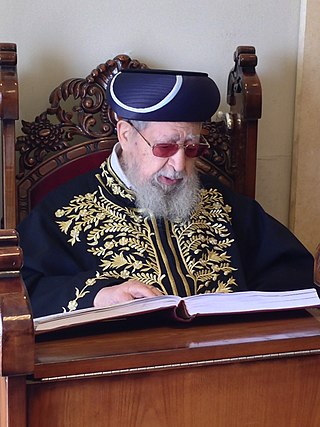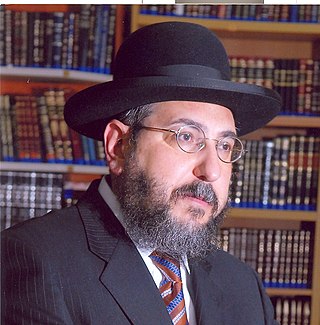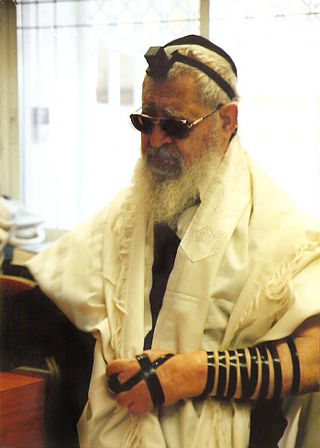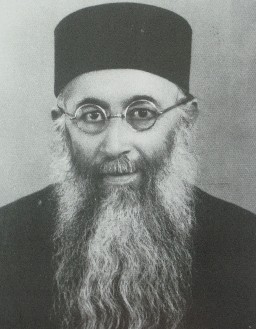
Shas is a Haredi religious political party in Israel. Founded in 1984 under the leadership of Rabbi Ovadia Yosef, a former Israeli Sephardi chief rabbi, who remained its spiritual leader until his death in October 2013, it primarily represents the interests of Sephardic and Mizrahi Haredi Jews.

Ovadia Yosef was an Iraqi-born Talmudic scholar, a posek, the Sephardi Chief Rabbi of Israel from 1973 to 1983, and a founder and long-time spiritual leader of Israel's ultra-Orthodox Shas party. Yosef's responsa were highly regarded within Haredi circles, particularly among Mizrahi communities, among whom he was regarded as "the most important living halakhic authority".

Shlomo Moshe Amar is the former Sephardic Chief Rabbi of Israel. He served in the position of Rishon LeZion from 2003 to 2013; his Ashkenazi counterpart during his tenure was Yona Metzger. In 2014 he became the Sephardic Chief Rabbi of Jerusalem.

Mordechai Tzemach Eliyahu, was an Israeli rabbi, posek, and spiritual leader.

Har Nof is a neighborhood on a hillside on the western boundary of Jerusalem with a population of 20,000 residents, predominantly Orthodox Jews.

Eliyahu Bakshi-Doron was an Israeli rabbi who served as Rishon LeZion from 1993 to 2003. Prior to that he served as Sephardi Chief Rabbi of Bat Yam and Sephardi Chief Rabbi of Haifa.
Ezra Attiya was one of the greatest teachers of Torah in the Sephardic Jewish world during the 20th century. He was rosh yeshiva of Porat Yosef Yeshiva in Jerusalem for 45 years, nurturing thousands of students who, together with their students, constitute the bulk of Sephardic Torah leadership today.

Porat Yosef Yeshiva is a Sephardic yeshiva in Jerusalem, with locations in both the Old City and the Geula neighborhood. The name Porat Yosef means "Joseph is a fruitful tree" after the biblical verse Genesis 49:22.

Rabbi Haim (Emile) Amsalem is an Israeli politician and a former member of the Knesset. Elected to the Knesset in 2006 as a representative of Shas, he left the party in 2011 and established Am Shalem. The new party contested the 2013 Knesset elections but failed to win a seat.

Ya'akov Yosef was an Israeli rabbi and politician who served as a member of the Knesset for Shas between 1984 and 1988.

Yitzhak Yosef is an Israeli Haredi rabbi. The former Sephardi Chief Rabbi of Israel, he also serves as the rosh yeshiva of Yeshivat Hazon Ovadia in Jerusalem's Romema neighborhood. Since the end of his term as Chief Rabbi, he joined the rabbinic leadership council of the Shas party.

Sephardic Haredim are Jews of Sephardi and Mizrahi descent who are adherents of Haredi Judaism. Sephardic Haredim today constitute a significant stream of Haredi Judaism, along with Sephardic Hasidim, and the Ashkenazi Hasidim and Lita'im. An overwhelming majority of Sephardic Haredim reside in Israel, where Sephardic Haredi Judaism emerged and developed. Although there is a lack of consistency in many of the statistics regarding Haredim in Israel, it is thought that some 20% of Israel's Haredi population are Sephardic Haredim. This figure is disputed by Shas, which claims that the proportion is "much higher than 20%", and cites voting patterns in Haredi cities to support its position.
Baruch Ben Haim was a Sephardi Hakham who served as Chief Rabbi of the Syrian Jewish community in Brooklyn, New York for 55 years. He taught at Magen David Yeshiva and established the Shaare Zion Torah Center at Congregation Shaare Zion. He was a protege of Rabbi Ezra Attiya, rosh yeshiva of Porat Yosef Yeshiva, who trained and dispatched students to leadership positions in Sephardi communities around the world.

Yaakov Hai Zion Ades, also spelled Adas or Adess, was a Sephardi Hakham, Rosh Yeshiva, and Rabbinical High Court judge. As rosh yeshiva of Porat Yosef Yeshiva in Jerusalem, he raised thousands of students, including Rabbi Ovadia Yosef, Sephardic Chief Rabbi of Israel; Rabbi Ben Zion Abba Shaul, rosh yeshiva of Porat Yosef; and Rabbi Yehuda Hakohen Rabin, Chief Rabbi of Bukharan Jewry in Israel.
Moetzet Chachmei HaTorah is the rabbinical body that has the ultimate authority in the Israeli ultra-Orthodox Sephardic and Mizrahi Shas Party.

Eliyahu Ben Chaim is a Sephardi rabbi, Talmudic scholar, and Orthodox halachist. He is the Av Beit Din of Mekor Haim in Queens, New York, and a prominent leader of New York's Sephardi Jewish community.

Moshe Yosef,, a leading rabbi in Shas, is the head of one of the largest kosher organizations in Israel, Badatz Beit Yosef, and the head of the Maor Yisrael, which publishes the works of his father, Rabbi Ovadia Yosef, former Chief Rabbi of Israel. Moshe Yosef is the sole inheritor of his father's writings, and has ownership of "published works as well as ownership of the large archive of handwritten works and his personal library". He lives in Har Nof.

Shalom Cohen was an Israeli Haredi Sephardi rabbi. He was rosh yeshiva of the Old City branch of Porat Yosef Yeshiva, and the spiritual leader of the Shas political party. He was a member of the party's Moetzet Chachmei HaTorah rabbinic council from 1984 until his death and was its oldest member.

Shimon Baadani, also spelled Shimon Ba'adani, was a leading Sephardi rabbi and rosh kollel in Israel. He was the co-founder and dean of Kollel Torah V'Chaim in Bnei Brak, and served as president of dozens of Torah institutions. He was also a senior leader of the Shas political party and a member of that party's Moetzet Chachmei HaTorah rabbinical leadership council.
The Yosef family is an Israeli family noted for prominent Mizrahi Rabbis, and for its involvement in Israeli politics through the Shas political party. Rabbi Ovadia Yosef, Sephardic Chief Rabbi of Israel from 1973-1983 and founder of Shas, was considered the pre-eminent leader of Mizrahi Jews during and after his lifetime. Yosef also founded the Badatz Beit Yosef, an agency for certifying a food's kosher status. The agency is one of the largest in Israel, and is a major source of wealth for the family.



















